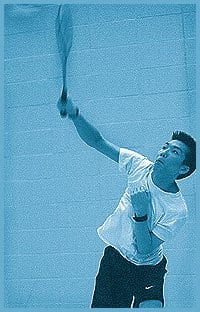For the youngest member of Team Toronto, deciding to go to the Gay Games in Sydney this fall was part of his search for gay sports heroes.
Johan Kim, 20, was playing for the Varsity men’s badminton team, in his first year at University Of Toronto, and getting the usual grief as an out gay man.
“Badminton is already considered a sissy sport,” says Kim, who studies international relations, “and I guess I unsettled the guys more. You know, I showed up for my first year, all ready to go, with my eyebrows shaved. But the guys were uncomfortable playing partners with me. I was outed in high school and had to switch schools every year – badminton and track got me through, but people still said you can’t be gay and do sports.”
Thinking there had to more Mark Tewksbury’s, Kim turned to the Internet, typed in “gay” and “Olympics,” and discovered the Gay Games. “I decided right then I had to go.”
Kim’s biggest supporter up until then was his father, a Korean diplomat who retired from the foreign service when Johan was 12 and settled his family in Scarborough and opened a Korean restaurant. When Johan was 14, his father discovered a copy of Xtra in his bedroom.
“He asked me if I was gay and I said yes. Then he was like, ‘Oh, okay, here’s your lunch money.’
“He would talk about my high school sports and academic accomplishments to customers in his restaurant, and he would talk about me being gay like that was an accomplishment,” he says. “That was tough for people in the Korean community to understand. Their idea of gay people is that they’re saganye – they’re crazy, totally abnormal.”
But Kim’s world was rocked when his father died last Sep 12, a day after two cousins were killed in the World Trade Centre disaster. Three months later, Kim’s mother asked her gay son to stop being “out” – or to move out.
“My mom was concerned about what people in the Korean community thought,” says Kim, “and she worried that me being gay was affecting business at the restaurant.”
With the help of U of T’s sexual diversity advocacy office, Kim moved into residence at University College, arguably U of T’s most gay positive space. And though he took a break from playing for varsity this year, he’s more determined than ever to go to the games. A friend sponsored his $195US registration fee and he’s working part time at the SkyDome to save the $2,000 airfare. He’s also taking an active role with Team Toronto, promoting the games to youth and visible minorities.
“My father always told me to try, and then to try harder,” says Kim, “so that’s become my motto. Try and try again.”
Ironically, Kim, who is also a volunteer facilitator for Gay And Lesbian Youth Of Toronto, is searching for strength in his Korean heritage. Growing up with family friends in Sweden (“hence, my name”) and living with a Jewish family while his parents took various postings, he was a bit shocked when he found out he was Korean when the family reunited.
“I had a hard time with it,” he says. “In my mind I was Swedish and Jewish.” Now he’s taking a minor in Korean studies and won a scholarship to study that culture at UCLA for the summer.
“My professor said that he has never seen anyone as passionate about Korean history and culture,” says Kim. “We endured so much as a people, being invaded countless times and being forced to assimilate or being outlawed, but we survived. It makes me think I am a strong person, being Korean, and I can use that experience to be strong about being a queer person. We both endure so much. Endure, endure. That’s where I make parallels.”
In Sydney, Kim will compete in badminton, the 400 metre sprint and triple jump. He also plans to seek out the only two other games athletes who are younger. In his high performing style, he hopes to make a documentary film of this global encounter of queer youth.
“I’m really focussed on bringing change for queer youth,” says Kim. While the previous generation’s “out” politics have enabled youth to come out at ever younger ages, the gay community, says Kim, is not doing enough to support that difficult journey.
“I want to be involved in the community,” says Kim, “but I’m always the youngest person and a lot of the older white guys don’t see the community as a diverse community. There’s no place for older and younger gays to mix where it’s not about sex and drugs and rock and roll. I want a voice and to be supported and respected, without being chicken hawked into the party scene. That’s not me.”
As for the games, he says he’d like to do well in his events. But clearly there’s a bigger game going on.
“I’m going to meet and talk to queer people from all over the world. I’m going to be experiencing so many new things all at once. I think my eyes will really be opened.”
* This is the first in a series of profiles of Gay Games athletes.

 Why you can trust Xtra
Why you can trust Xtra


